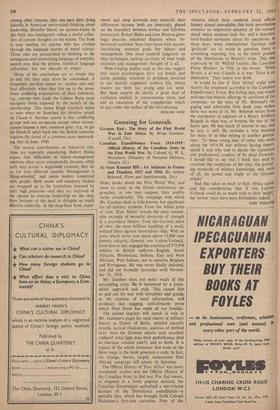Gunning for Generals
German East : The Story of the First World War in East Africa. By Brian Gardner. (Cassell, 25s.) Canadian Expeditionary Force 1914-1919: Official History of the Canadian Army in the First World War. By Colonel G. W. L. Nicholson. (Ministry of National Defence, Ottawa, $5.)
As from Kemmel Hill: An Adjutant in France and Flanders, 1917 and 1918. By Arthur Behrend. (Eyre and Spottiswoode, 21s.)
MORE books about the First World War, and more to come, as the fiftieth anniversary ap- proaches; as one may suppose, their quality varies considerably. The campaign with which Mr. Gardner deals is little known, but significant for all military students. From the Allied point of view, 'East Africa' reveals the most remark- able example of wasteful diversion of strength in a secondary theatre; from the German point of view, the most brilliant handling of a small, isolated force against tremendous odds. With an army which never rose much above 15,000 men (mostly askaris), General von Lettow-Vorbeck, from first to last, engaged the attention of 372,950 soldiers in British uniform—English, South Africans, Rhodesians, Indians, East and West Africans, West Indians, not to mention Belgians and Portuguese. He was never finally defeated, and did not formally surrender until Novem- ber 23, 1918.
Mr. Gardner does not make much of this astounding story. He is hampered by a journ- alistic approach and style. This causes him to pad out his text with trivialities and gossip, at the expense of hard information, and produces that nagging, anti-climactic prose which Fleet Street has made all too familiar.
The serious inquirer will search in vain in Mr. Gardner's pages for such sinews of military history as Orders of Battle, detailed casualty returns, tactical illustrations, analyses of method (why were the German askaris such excellent soldiers? what light does their performance shed on German colonial rule?), and so forth. It is typical of the whole treatment that none of the three maps in the book possesses a scale. In fact, the strange, heroic, largely unnecessary East African campaign still awaits its historian.
The Official History of 'East Africa' was never completed; neither was the Official History of the Canadian Army in that war. For that reason, in response to a lively popular demand, the Canadian Government authorised a one-volume account of the Dominion's contribution—a splendid idea, which has brought forth Colonel Nicholson's first-rate narrative. Free of the minutia which have rendered much official history almost unreadable, this book nevertheless contains an impressive quantity of the relevant detail which students look for, and a detached, level-headed viewpoint about the operations. In these days, when international 'loyalties' and `gratitude' are so much in question, there is something imposing, too, in the whole posture of the Dominions to Britain's crisis. This was expressed by Sir Wilfrid Laurier, the Canadian Prime Minister, in 1910, in the words: 'When Britain is at war, Canada is at war. There is no distinction.' That makes you think. It would be fine if 'East Africa' could now receive the treatment accorded to the Canadian Expeditionary Force. But failing that, one would welcome last-minute offerings by survivors of the campaign, on the lines of Mr. Behrend's en- gaging and admirable little book (one wishes there was more of it). Mr. Behrend writes from the standpoint of adjutant of a Heavy Artillery Brigade in what was, at bottom, the war of the heavy gun. He has much of interest to say, and he says it well. He includes a wise warning for those of us who belong to another genera- tion : `To those young men of today who write about the 1914-18 war without having experi- enced it and who tear to shreds the reputation and professional conduct of its dead Generals, I should like to say that I think they tend to overlook the conditions of the time, the prevail- ing standards of military knowledge, and, most of all, the power and might of the German armies.'
And that takes us back to East Africa again, and the consideration that if von Lettovv- Vorbeck could do so much with so little 'might,' the 'power' must have been formidable indeed.
JOHN TERRAINB


































 Previous page
Previous page